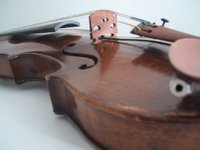Thoughts from a musician

Some time last February we had a violinist, Karl Stobbe, play for us in chapel. It was the best violining I have ever heard, even with the cds I have listened to. I was not only moved by the music but also by what he said. I wanted to write it down, but another idea came to me: why not just ask him for a copy of his lecture? So here is the paper he gave me.
I am a person who has always had difficulty with language. I often loose interest in lectures, and even sometimes in conversations. I have incredible trouble remembering names, remembering poetry, scripture, and have always struggled with “writer’s block”. It’s one of the reasons that i write (and read) word for word any public speaking that i have to do. I enjoy reading and poetry, but get absolutely distracted listening to somebody read. This is one reasons I don’t enjoy church music, or pop music. It always relies on lyrics to convey meaning, and for me, lyrics interfere with the real emotional content, which is in the harmonies and melodies. For me, music is a way of reflecting and listening to the world from a great distance, because it is removed from the ways we relate to each other in everyday life.
I have picked 4 pieces today that have been important to me, because they have helped me to define and understand my own faith.
1. Adagio from the Unaccompanied G-Sonata. Bach
One of the most powerful “spiritual” experiences I have ever had was with this piece. I was a student at UBC and was practising late one night in the chapel of the residence i was living at. I played this piece through and thought to myself that in this music I could feel God communicating with me. Maybe that is what music is to me--it’s a way of listening to God, and although I don’t understand anything in a direct fashion, there are no words that could describe what is being said. To this day, whenever I have extra need to feel that my faith is real, I play this piece.
2. Nigun from Baal Shem Suit--Bloch
I have always been impressed by the drama of this piece. I see life in it--the ups and downs, the climaxes and the desolation, and the peace and tranquility that eventually bring it to an end.
3. “Spring” Sonata-- Beethoven
This piece represents childlike purity for me. It is a beautiful, simple piece written with the confidence of somebody who see that he has the ability to communicate with the world, but hasn’t yet started questioning his own role in music. It is written just before Beethoven begins to understand he is losing his hearing, and the huge and profound changes in his personality and in his music that evolve with his illness. THis is one of Beethoven’s last pieces where I still think he has a childlike faith. Faith in his ability as a composer, untouched by the questions that will soon drive him almost to the point of suicide. It has four separate movements, each with its own mood and character.
4. Corrigliano--Red violin Caprices
When I first learned to play the violin, I would practice my scales and arpeggios, listen to my teachers and try things until I got them. I didn’t really understand the technical demands that were being thrust on me, I just did them, and they usually ended up being fine. When I was about 17, I started to want to understand how these technical aspects of playing the violin worked. I started to question that I could even do them, because I didn’t know how I did them-- and I started having trouble doing many of them. I am not unique in this situation, and I think that the large majority of violinists go through these stages, and it is important that we do. I needed to relearn how to play the violin, and eventually after a lot of studying and questioning, I was able to do all those things with confidence again. Life is like that, faith is like that. .... From the whole hearted acceptance of a child, to the consistent questioning and studying, and then to a more mature understanding and acceptance of faith--something I’ve only begun to understand in the past few years. This piece is like that, it has incredible technical demands that must be rehearsed, prepared and prepared, but eventually, you must simply have the faith that it will work.


0 Comments:
Post a Comment
<< Home